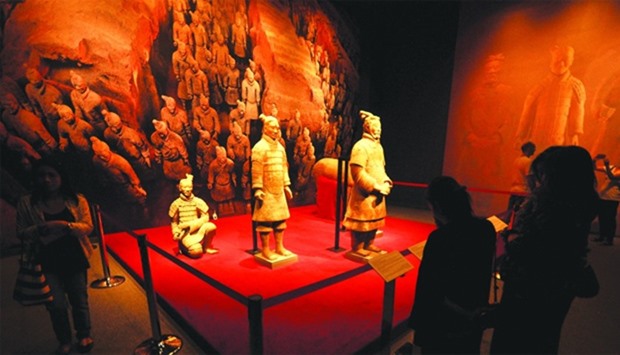The Qin emperor was buried in 210-209 BCE with a collection of clay-based sculptures known as the ‘Terracotta Army’, which was believed to accompany and protect him in the afterlife.
It was estimated that the sculptures, a form of funerary art, numbered more than 8,000 soldiers, including hundreds of chariots, horses, and cavalry horses, as well as other non-military figures.
For 11-year old Doha resident, Kai Gamaliel, seeing a handful of soldiers from the Terracotta Army, currently on exhibit at the Museum of Islamic Art, was a “once-in-a-lifetime experience.”
Kai viewed the sculptures of a general and two soldiers, as well as a shooter and a horse in awe as they stood gallantly inside the museum’s Special Exhibitions Gallery, which also displayed hundreds of other artefacts from the Neolithic period to the Qing Dynasty.
“I have only read about these terracotta warriors in books and have seen similar characters in the movie ‘The Mummy: Tomb of the Dragon Emperor’ but to stand in front of some these historic pieces was a learning experience.
“I am excited to tell my classmates about it and I will encourage them to visit the Museum of Islamic Art because aside from books, seeing museum pieces such as the Terracotta Army will provide students like us additional knowledge of world history,” he pointed out.
French national Mathilde is an avid patron of the Museum of Islamic Art, and regularly visits its website for updates of the latest exhibitions. Her 10-year old daughter, Lalique, described the Terracotta Army exhibition as “very interesting.”
“The back stories about the terracotta warriors, as well as the other Chinese artefacts on show are very fascinating,” added Mathilde, who was among the growing number of visitors of the exhibit, which will run until January 7, 2017.
Visitors can view the exhibition during the following museum schedule: Sunday, Monday, and Wednesday - 10:30am to 5:30pm; Tuesday - closed; Thursday and Saturday - 12pm to 8pm; and Friday - 2pm to 8pm.
The five terracotta sculptures are part of the ‘Treasures of China’ exhibition, a cultural exchange programme between Qatar and China, which showcases 5,000 years of Chinese history through pottery, bronze sculptures, gold and silver jewels, and enamel work.
Qatar, on the other hand, will hold the ‘Pearls: Jewels from the Sea and the Rivers’ exhibition at the National Museum of China in Beijing from September 27 to January 8, 2017.
The exhibition presents the history and legend, mythology, and meaning of pearls and pearl jewellery from Qatar and around the world, and contains more than 100 pieces from around the world, including the Gulf, Europe and Asia, according to the Qatar Museums website.


